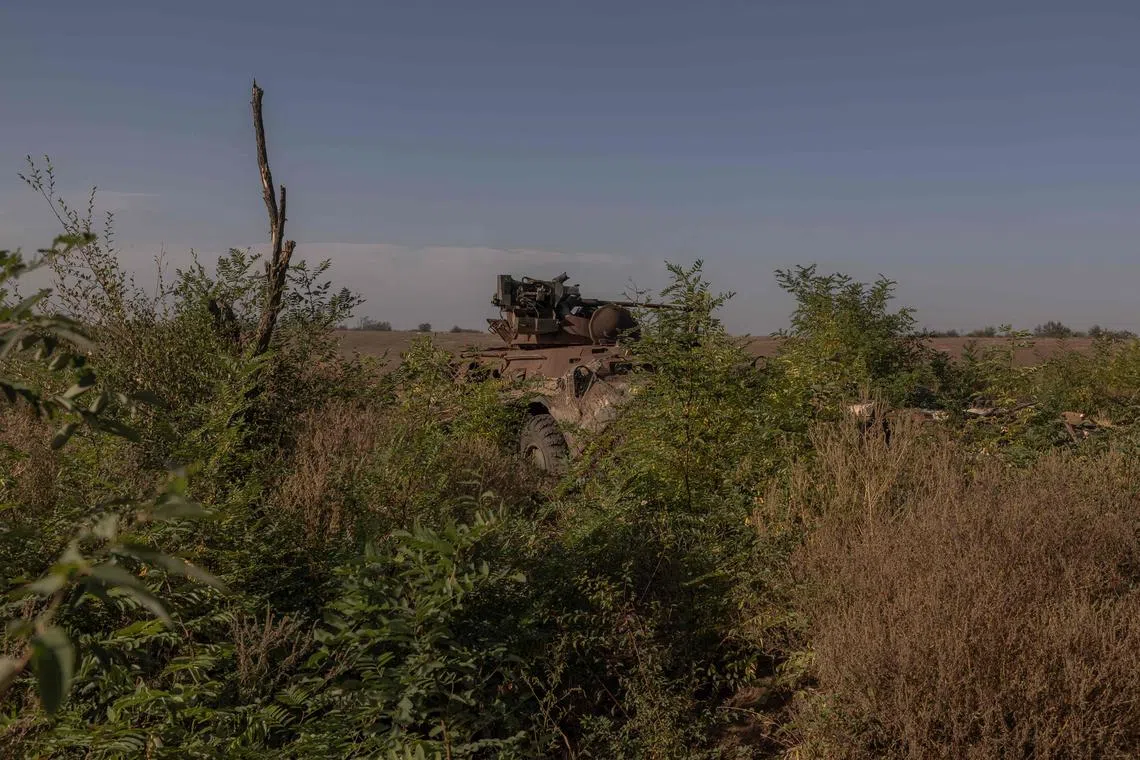Russian women are starting to demand Putin bring their men home from war in Ukraine
Sign up now: Get ST's newsletters delivered to your inbox

More than 600,000 Russian troops are deployed in Ukraine.
PHOTO: AFP
Follow topic:
MOSCOW – More than a year after President Vladimir Putin summoned 300,000 draftees to fight in Russia’s war in Ukraine, some of their families are starting to demand they come home.
Wives, mothers and girlfriends of mobilised Russian soldiers have begun protests calling on the Kremlin to bring their men back from the war.
Their movement, called The Way Home, has gained more than 37,000 followers on its Telegram channel in support of calls for demobilisation of the troops called up in September 2022.
So far, the authorities have limited their response to sending the police to warn organisers against protesting.
While the number involved now is relatively small, the movement risks embarrassing the Kremlin as Mr Putin prepares for presidential elections in March 2024.
Officials claim overwhelming public support for the invasion of Ukraine that has lasted almost two years with no end in sight.
“We are in favour of complete demobilisation, not rotation. We don’t want anyone to go through what we went through,” said Ms Maria, 26, from Moscow, an activist whose boyfriend was among the first to be drafted.
“I personally want the military operation to end. How can you feel good about the fact that people die every day, that someone’s body gets eaten by rats in the fields?”
Ms Maria asked not to disclose her surname or identify her boyfriend, fearing official retaliation.
She said she had expected the army to send him home from Ukraine after six months and then after a year, until “the full realisation came that the authorities are not going to bring our men back to us”.
Mobilisation is a sensitive question for the Kremlin.
Mr Putin’s decision to order the partial call-up
The Kremlin has denied suggestions of a second wave of mobilisation.
Mr Putin, who said 617,000 Russian troops were deployed in Ukraine, acknowledged at his marathon news conference last week that public concern over a new draft was a “burning issue”, while insisting there was no need for one now.
While surveys by the Moscow-based Levada Centre show about three-quarters of Russians say they support the invasion, some 60 per cent also worry the war may lead to a general mobilisation.
A majority say they favour peace negotiations to end the conflict.
The late Wagner mercenary group leader Yevgeny Prigozhin had promised freedom to thousands of prisoners recruited from Russian jails if they survived six months at the front in Ukraine.
Russia’s Defence Ministry set no time limit for the mobilised soldiers.
“Russia’s military elite is against demobilisation,” and it is significant that Mr Putin announced his re-election run at a meeting with people whose children died in the war, said Ms Tatiana Stanovaya, founder of R.Politik, and a political consultant.
The Kremlin wants regional governors to “extinguish” the women’s protests to stop them gaining support, she added.
Kremlin spokesman Dmitry Peskov and Russia’s Defence Ministry did not respond to requests to comment.
Members of the protest movement published a video manifesto in December, denouncing mobilisation as “legalised slavery” and demanding a maximum one-year limit on military service before draftees are returned home.
They questioned whether mobilised soldiers were “in the combat zone voluntarily”.
Organisers wear white headscarves, a tribute to the mothers’ movement in Argentina that campaigned for the return of their disappeared children during the military dictatorship’s “Dirty War” of 1976 to 1983 against domestic opponents. Participants have taken their case to lawmakers in the State Duma and officials in the presidential administration, but without success.
About 30 women protested at Moscow’s central Theatre Square on Nov 7, urging the authorities to “let the mobilised go home”. The police quickly surrounded the group and told them to leave.
Supporters of The Way Home also laid flowers at the Eternal Flame, the monument to the World War II dead outside the Kremlin walls, to draw attention to mobilised soldiers who had been killed, when Russia marked the patriotic Day of Heroes of the Fatherland holiday on Dec 9.
Drafted soldiers want to leave the war, but many have “lost hope”, said Ms Maria.
“At the same time, murderers, rapists, cannibals, who are released from prison, return home after six months. I feel like I’m living in a dystopia.” BLOOMBERG

